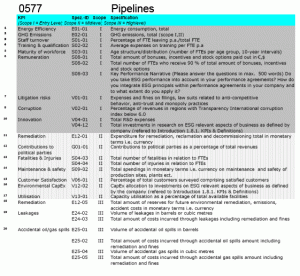 Whenever a journalist describes anything as a “big beast” I always instinctively think of the leading UK politician, Ken Clarke (pictured).
Whenever a journalist describes anything as a “big beast” I always instinctively think of the leading UK politician, Ken Clarke (pictured).
Don’t ask me why .. I guess he’s managed that rare thing of an almost completely successful political career and it’s difficult to think of a political beast with bigger Hush Puppies and more cigars than he.
Which is kind of how the CSR reporting community tend to regard GRI these days. It is the de facto standard for reporting and if you don’t do GRI you’re generally regarded as somehow second best.
However I recently found myself on the website of the Federation of European Accountants (it’s an exciting life I lead) and from there a quick hop, skip and jump brought me to the “KPIs for ESG” document published last September by the German Society of Investment Professionals (DVFA). (ESG: environmental, social and governance).
At which point my jaw hit the ground .. here was something which could really rival GRI’s dominance.
Actually this is ESG, not CSR
The first thing to make clear is that these are KPIs for ESG, whereas GRI is generally skewed more towards the CSR side of reporting. You can argue the difference between the two and still never get a satisfactory answer. They are nevertheless different facets of the same diamond .. unsustainable and unethical behaviour looked at from different points of view.
The second is that ESG is generally a lot tighter and less woolly than CSR. This is because its perspective is that of investors, and they tend to be a pretty no nonsense bunch who can easily see through the flimflam which can make up a large proportion of many CSR reports.
For instance, although KPIs for ESG has no overarching general reporting framework it makes certain general points precisely and without ambiguity. These include:
- companies should use integrated reporting; ie. include ESG KPIs within their annual reports
- data should be continuous; ie. there should be no material or time gaps and data should always be kept up to date (e.g. on websites)
- data should be published through annual reports, on websites and as a normal part of analyst publications
- supporting reference data should also be published which includes financial, numerical and industry benchmark figures.
Thanks to the causes of the current recession investors have lost their appetite for complicated and opaque financial returns: it is appropriate that a high level of transparency is woven into any form of ESG reporting guidelines.
Sectoral KPIs
Where KPIs for ESG really comes into its own is in its sectoral measurements. These are a list of indicators which companies can report against according to their sector, based upon the Dow Jones categorisation of 114 industry subsectors (the same classification Corporate Eye uses).
For example, the Oil & Gas group has KPIs for exploration & production, integrated oil & gas operations, equipment & services, pipelines, renewable energy, and alternative fuels. In total this spans 149 KPIs ranging from political donations (mid-level); cost of oil spill remediation and fines (high level), and fines and lawsuits on anti competitive behaviour (entry level).
For the record, the other groups covered are: Basic Materials, Industrials, Consumer Goods, Health Care, Consumer Services, Telecommunications, Utilities, Financials, and Technology.
Not competition, collaboration
I’m tempted to say that there’s not a lot more that most businesses could need as a set of KPIs to report against. Certainly, the indicators seem to be well thought out and fit the businesses they’re aimed at very well.
What really puzzles me, though, is GRI and their continuing work on sector supplements. Surely here is a great springboard for them to use? So instead of being big beasts all hunting separately in the jungle of sustainability, these organisations ought to get together and work it out between them.
In fact, this is already happening behind the scenes and there is a lot of momentum now growing for a universal set of CSR/ESG reporting KPIs. I’m just amazed that these haven’t been given any greater publicity .. does anyone know why?
Picture Credit: shadow business secretary Kenneth Clarke by Underclass Rising under Creative Commons Attribution Share Alike License.
A former CTO, Chris has a broad and varied background. He’s been involved with blue chips, consultancies & SMEs across a wide variety of sectors and has worked in Europe, the Middle East and Australia.
In 2007 he decided to combine his knowledge of business and IT with his passion for all things sustainable and has been busy writing ever since. However, his greatest ambition remains to brew the perfect cup of coffee.
